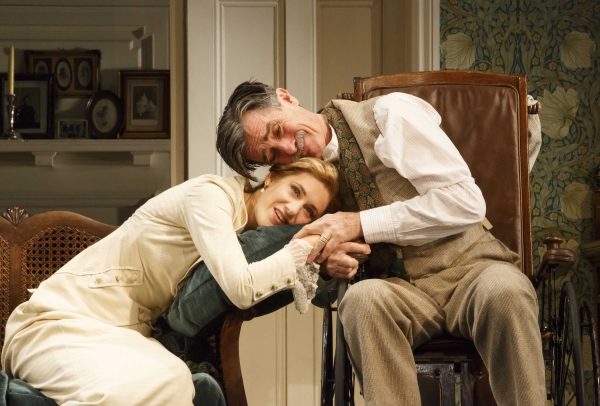The Winslow Boy
Tony Award winner Roger Rees leads a strong cast in Roundabout’s rare American staging of Terence Rattigan’s lackluster family drama.

(© Joan Marcus)
The desire for “right” (not to be confused with “justice”) to prevail is the engine that drives Terence Rattigan’s 1946 play The Winslow Boy. Unfortunately, it’s an engine that runs on fumes. Imported from the Old Vic Theatre in London, director Lindsay Posner has remounted the production with a brand new cast at Roundabout Theatre Company’s American Airlines Theatre. While it boasts a company of skilled actors, the theatrical fire they have managed to create onstage disproportionately outweighs the minimal fuel Rattigan originally pumped into the play’s tank.
The Winslow Boy, known to be one of Rattigan’s most celebrated plays, was inspired by the British cause célèbre that resulted from an accusation of theft against 13-year-old George Archer-Shee as a cadet at the Royal Naval College, Osborne in 1908. Archer-Shee is theatricalized as the character Ronnie Winslow (played by the young Spencer Davis Milford), the victim of this accusation in the play — though his status as a “victim” is highly debatable.
Ronnie returns home distraught after being expelled from Osborne for stealing a five-shilling postal order — a relatively minor crime he unwaveringly insists he didn’t commit. His cries of innocence set his father, Arthur Winslow (played by Tony Award winner Roger Rees), on a passionate crusade to clear his name while the boy, himself, proceeds to settle comfortably into a new school and all but forget his former woes.
Rees shines as the head of the Winslow household, exhibiting a silent regality that slowly crumbles as the fight to wipe the stain from his son’s name takes its emotional and physical toll. Though the sacrifices he and the rest of his family make, weighed against the potential gains of a legal victory, do not balance the scales of justice, Arthur insists on striving for right, living by the words “let right be done” (translated from the Latin phrase “fiat justitia”) — a term that becomes both his personal motto and a necessary legal endorsement he must obtain for his petition of right to be heard by the courts.
Despite Arthur Winslow’s unyielding fighting spirit, the play never manages to fend off our lingering doubts regarding the truth of Ronnie’s story. Even a coveted stamp of approval from the Winslows’ shrewd lawyer, Sir Robert Morton, following his heated interrogation of the boy (brilliantly delivered by Alessandro Nivola), can’t shake the nagging suspicion that we’re being conned by a cherubic face and crocodile tears. With these doubts tugging at our subconscious, Arthur Winslow never quite becomes the noble martyr we need our hero to be if we are expected to wholeheartedly invest our empathy and ardent hope in his struggle for nearly three hours. His suffragette daughter Catherine (a strong feminine role powerfully performed by Charlotte Parry) joins him in his uphill battle as well — despite contrary urgings by her fiancé John Watherstone (Chandler Williams) — though her actions seem driven more by political fervor than familial duty.
Posner does keep us entertained with his keen direction of Rattigan’s sharp wit (which fits Rees’ comedic sensibilities like a glove) along with a few endearing ancillary characters including Ronnie’s simple-minded dance-crazed older brother Dickie (Zachary Booth), the Winslows’ obliviously jolly nurse Violet (Henny Russell), and Catherine’s hilariously over-eager suitor Desmond Curry (a standout performance by Michael Cumpsty). Arthur’s wife Grace, who buckles under her family’s financial and emotional strain (capably portrayed by Mary Elizabeth Mastrantonio) offers a nice foil to her husband’s steadfast convictions.
However, it takes an especially engaged audience to latch onto all of the plot points and relationships that evolve onstage via Rattigan’s beautifully crafted but occasionally dry dialogue. All of the action takes place in the Winslows’ Edwardian living room (elegantly designed by Peter McKintosh for the production at the Old Vic, resized to fit the American Airlines stage), where different combinations of characters pass through to discuss the state of their respective affairs. Only Arthur Winslow’s heartbreaking physical disintegration truly shows us the extent of his family’s sacrifice — one of the play’s most poignant throughlines. Though, after the lawsuit is put to rest and right has supposedly been done, rather than reveling in this devoted father’s cathartic moment of victory, you want to throw him a pitied glance and ask: Now was that really worth it?










